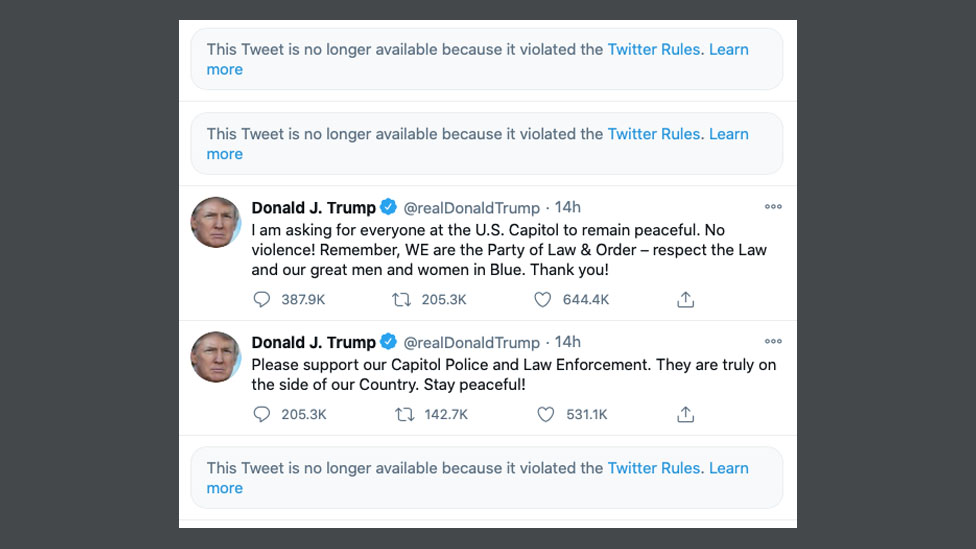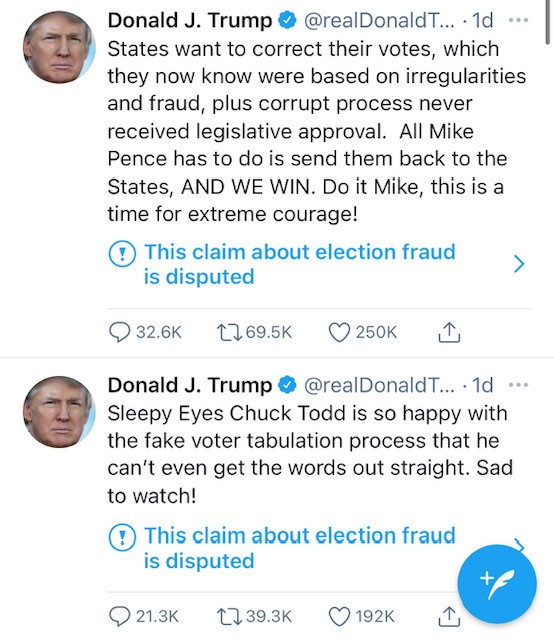While the UK government and Ofcom progresses plans for Online Harms laws in the UK, the outgoing US President continues to test the boundaries and patience of social media platforms.
Following the scenes of violence in and around the US Capitol building last night, taking account of the social media posts he published during and after the attack on the Capitol building, the social media platforms took decisive action.
Trump was suspended from Twitter for 12 hours. That suspension was lifted on condition that three of his most recent posts are, and remain, deleted. Twitter said it required the removal of three tweets for "severe violations of our Civic Integrity policy". In response to this threat of a longer-term suspension, it appears that Trump was persuaded to remove the posts himself rather than Twitter deleting them on his behalf.
In one deleted tweet, which was posted while the rioters were inside the Capitol building, Trump addressed the rioters by video, telling them that he loved them, calling them 'patriots' and asking them to go home in peace, but reiterating that the election was 'stolen' from him and making other incoherent statements. In a live speech to supporters a couple of hours before the Capitol building was attacked, Trump had said he would "never concede", repeated claims that the election had been "stolen" from him and his supporters, and going so far as stating that Biden will be an "illegitimate" president, among other claims.
Responding to unfolding events, Twitter stated: "We have been significantly restricting engagement with Tweets labelled under our Civic Integrity Policy due to the risk of violence".
Some of Trump's earlier tweets, which were less controversial and called for respect for law and order, remained visible.

Twitter made clear that "Future violations of the Twitter Rules... will result in permanent suspension of the @realDonaldTrump account". On his final warning, he posted a tightly scripted pre-recorded statement on his return to the platform. He then resumed tweeting, initially in a markedly more considered tone, including to confirm he will not be attending the inauguration of Joe Biden on 20 January and one further post which stated: “The 75,000,000 great American Patriots who voted for me, AMERICA FIRST, and MAKE AMERICA GREAT AGAIN, will have a GIANT VOICE long into the future. They will not be disrespected or treated unfairly in any way, shape or form!!!”
Given the febrile atmosphere the President appears to be stoking, and risk of further sedition and real world violence, Twitter considered that these posts breached its rules and banned Mr Trump from its platform indefinitely. None of his tweets are therefore currently accessible on Twitter.
Did this come from nowhere?
No. A number of the president's tweets and re-tweets have been flagged by Twitter in recent months for either making claims about election fraud which are 'disputed' or for violating Twitter's rules about 'spreading misleading and potentially harmful information'. There are a countless examples, ranging from tweets about his immunity from Covid-19 (posted immediately after he recovered from the virus), to claims attacking the integrity of the election process and election result.


How have other social media platforms reacted to the events of the past 12-24 hours?
The other platforms have also taken action, with Facebook and YouTube removing the video mentioned above. It was reported that Facebook initially also banned Donald Trump for 24 hours, but Mark Zuckerberg subsequently announced that the ban has been extended indefinitely - and at least until the peaceful transition of power to the new president has been completed.
In removing the content, Facebook said: "We removed it because on balance we believe it contributes to rather than diminishes the risk of ongoing violence." And in explaining the extended ban, Mr Zuckerberg stated in a Facebook post that "We believe the risks of allowing the President to continue to use our service during this period are too great". That unprecedented and damning post can be read in full here.
Twitch has disabled President Donald Trump’s account indefinitely, but will review the ban after he leaves office. A Twitch spokesperson stated: “In light of yesterday’s shocking attack on the Capitol, we have disabled President Trump’s Twitch channel. Given the current extraordinary circumstances and the President’s incendiary rhetoric, we believe this is a necessary step to protect our community and prevent Twitch from being used to incite further violence.” Trump’s Twitch account remains live, so archived videos and his profile are still available, but he cannot stream while his account is disabled.
Snapchat also stopped Mr Trump from creating new posts, but did not say if or when it would end the ban.
Parler, an alternative social media platform that seemed to offer the prospect of a safe haven for Mr Trump and his followers has been pulled by Amazon, Google, Apple and others, so is no longer available.
Repercussions and reverberations
It is too soon to tell what the wider repercussions will be, in the US and elsewhere.
One likely impact in the months to come is that the UK government and Ofcom will be closely watching not only the political developments but the actions and reactions of the social media platforms in handling these issues as the UK government looks to formulate its own regulatory framework to guard against a range of 'online harms', which might include political sedition. These are important issues, and now more than merely theoretical, and considers the ways in which social media platforms should and/or can be regulated
In the meantime, even in the absence of regulation, the social media platforms seem to be stepping up to the plate in the face of this unprecedented challenge to established democratic institutions, customs and norms.
Their 'crisis management' plans, and those of the UK government, will now probably involve a few more scenarios, as previously unimaginable scenarios look increasingly possible.
Matt Hancock commented on 10 January 2020 that Twitter's banning of Trump implies it is taking "editorial decisions" and raises questions about regulation. Given the incitement to insurrection, and the fact various individuals have been banned from the platform for breaching lesser rules over many years, this was a particularly oddly worded remark from Mr Hancock. Surely if the platform had allowed itself to be used as a platform for insurrection, no less, it might have been even more of a target for criticism (and worse).
The Health Minister made the remarks on the same day that he agreed the police in Derbyshire were right to fine two socially distanced women who went for a walk while holding a coffee - police officers told the women the coffee could be considered a 'picnic' and they shouldn't have driven 5 miles from their home (even in separate cars and even to avoid more crowded areas closer to their homes). The Minister's comments were made despite intense criticism by MPs and human rights lawyers of the way the incident was handled, and following a statement from the National Chief Police Council, which pointed out there were no legal restrictions on the distance one could travel for exercise. Derbyshire Police, whose officers issued the fines, said it will review all fines given out during the current lockdown.
Despite the Health Minister's slightly clumsy and poorly-timed intervention, and the fact it shows we must remember to give proper weight to human rights in all we do, the events playing out in the US (online and on the streets) will affect future regulation of online harms in the UK, as the government seek to assert more control over social media platforms.
The sentiment that our established democratic institutions should be in charge of protecting our democracy makes perfect sense of course, but the fact that a US President can 'go rogue' in this way (a way which appears to pose a direct threat to all democratic institutions in the US and indirectly throughout the West), means that we have to ensure the new safeguards we introduce to guard against online harms and to protect democracy and free speech cannot be used to create other types of harm, and to smother democracy or free speech in the UK and beyond.
On 11 January, German Chancellor Angela Merkel expressed her concern at the suspension of Donald Trump from the main social media platforms. In a statement, her spokesperson Steffen Seibert said the move was "problematic" because freedom of opinion should be determined by legislatures, not tech bosses.
This article was last updated 11 January 2021
"We have been significantly restricting engagement with Tweets labelled under our Civic Integrity Policy due to the risk of violence" - Twitter "We believe the risks of allowing the President to continue to use our service during this period are too great". - Facebook
 unknownx500
unknownx500










